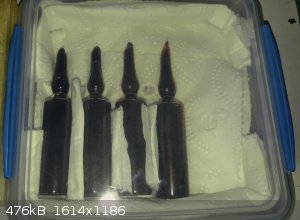j_sum1
Administrator
       
Posts: 6222
Registered: 4-10-2014
Location: Unmoved
Member Is Offline
Mood: Organised
|
|
When prudent practice works
I had an experience in the lab today that made me quite pleased with the some of the precautionary procedures I had taken.
I was demonstrating the properties of bromine to some students in an online Chemistry lesson. Well, that was the intent. But when I opened the jar
that contained all of my bromine ampoules I discovered all of them wet and clammy with condensed bromine. No gloves.
It was great to be able to calmly reach around the corner and grab my spray bottle of thiosulfate solution and liberally apply it to exposed skin and
any other affected surfaces.
It was also great to see that the bed of thiosulfate at the bottom of the jar had absorbed most of the escaped vapours and saved the lid from
corroding badly and probably protected everything else in the vicinity.
It turns out that there was a miniscule crack in one of the ampoules where it had been sealed. Not sure if it was a stress crack from when I sealed
it or whether it had been knocked. Those Houdini halogens can get out of anything it seems.
Anyway no harm done. But large containers, no secondary containment, no spill neutraliser and no remedial spray and things could have been a lot more
messy.
|
|
|
woelen
Super Administrator
        
Posts: 7977
Registered: 20-8-2005
Location: Netherlands
Member Is Offline
Mood: interested
|
|
Oh yes, bromine escapes from any container, which is not completely sealed glass. Even a minor crack will lead to problems.
This actually is true for every volatile chemical, but with stuff like Br2 you notice it.
I had a similar experience with my ampoules of SOCl2. After ampouling all of my SOCl2 I put the ampoules in a small plastic bucket with a screw cap
and wrapped each ampoule individually in a thick layer of paper tissue. After a week or so, I inspected the new ampoules and on opening the bucket, I
was greeted with white fumes of HCl and a strong smell of SO2. The inside was wet and all paper tissue had become soft and immediately teared apart
when a little force was applied to it.
I cleaned the ampoules and the inside of the bucket and applied new paper tissue. The offending ampoule was found by carefully smelling at the seals
on all ampoules. Just one of them had a smell of SO2, the others were odorless. Only 10% or so of the contents was lost, it is amazing to see that
just a ml of SOCl2 can make such a mess. The same is true for Br2.
The secondary packaging and the paper towels assured that no damage was done to surrounding tools and containers.
[Edited on 13-2-20 by woelen]
|
|
|
XeonTheMGPony
International Hazard
    
Posts: 1636
Registered: 5-1-2016
Member Is Offline
Mood: No Mood
|
|
An ounce of prevention! is well worth its weight in gold.
These are on a bed of sodium bicarbonate in a sealed container.

|
|
|
Syn the Sizer
National Hazard
   
Posts: 591
Registered: 12-11-2019
Location: Canada
Member Is Offline
|
|
I agree wholeheartedly, in lab I always label all my beakers with large easy to read labels to prevent accidental mixing of 2 possibly incompatible
chemicals. However many of my classmates never label anything. They will grab new beakers and put them in the reagent fume hood with no labels and a
clear liquid, have unlabelled beakers in their fume hood or on the bench and walk around the class with beakers full of hot solvents like xylene and
no matter how many times the instructor gives them crap they don't learn.
One time a classmate for some reason had a beaker with 98% H2SO4 on the bench (unlabelled) he mistook it for his waste beaker and poured water into
it, needless to say it didn't end well, though lucky he didn't get hurt. He failed last semester and is no longer in the class. But still after his
mistake my classmates haven't learned.
I am also a strong believer that gloves should always be worn in the lab even if you are not dealing with toxic or hazardous chemicals, you never know
who spilled something and didn't clean it properly. Though our instructors aside from the O-Chem instructor will not let us put gloves on if we are
not dealing with dangerous stuff, they say its a waste of money, I feel a 10c pair of gloves could save a trip to the hospital.
|
|
|
arkoma
Redneck Overlord
      
Posts: 1761
Registered: 3-2-2014
Location: On a Big Blue Marble hurtling through space
Member Is Offline
Mood: украї́нська
|
|
J_sum, I believe i can state that you do know how to properly ampoule something. Thought I lost my passport other day---similar level of panic if you
can imagine. Calmed down took a nap and found it when I woke up.
"We believe the knowledge and cultural heritage of mankind should be accessible to all people around the world, regardless of their wealth, social
status, nationality, citizenship, etc" z-lib
|
|
|
j_sum1
Administrator
       
Posts: 6222
Registered: 4-10-2014
Location: Unmoved
Member Is Offline
Mood: Organised
|
|
Nice non-sequitur there, arkoma. Good thing I know what you are talking about.
Ampouling bromine is quite a different business from ampouling a solid, say, like iron oxide.
|
|
|